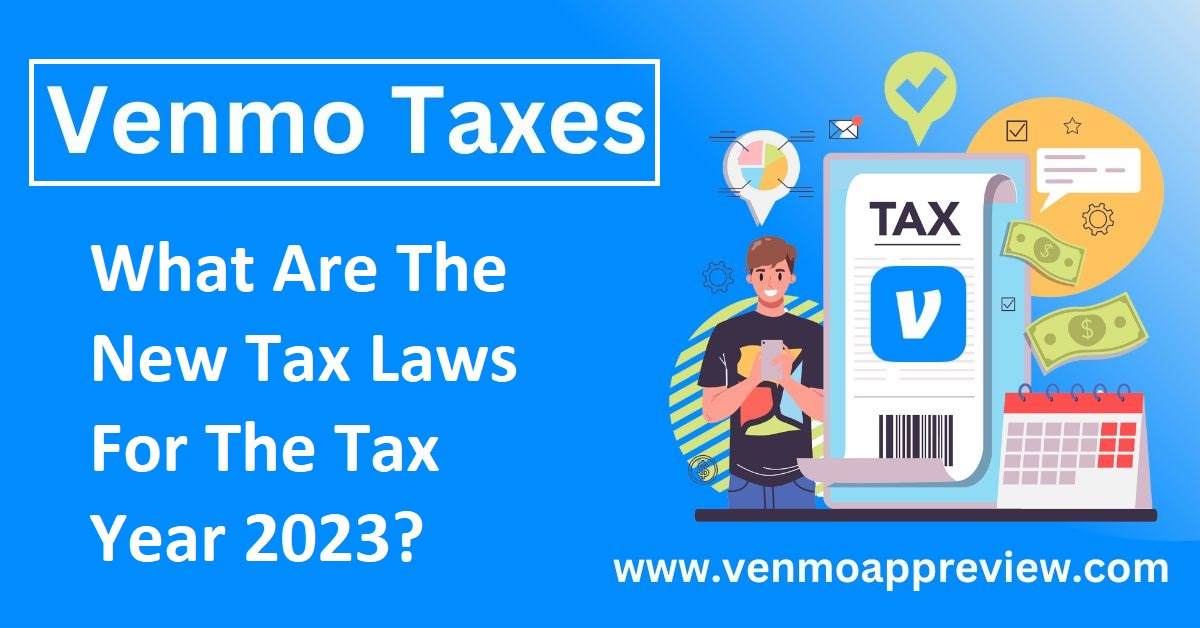Are you one of the millions of people who use Venmo to make transactions with friends and family? If so, it's important to understand how these transactions can affect your taxes. With new tax laws in place, it's more crucial than ever to know what types of Venmo transactions are taxable and how to report them on your tax return. In this blog post, we'll explore everything you need to know about Venmo taxes and the latest tax laws. Don't let confusion or misinformation cost you money at tax time – read on for all the information you need!
What is Venmo Taxes? What Are The New Tax Laws?
Venmo is a popular peer-to-peer payment system that allows users to easily send and receive money from their friends, family, or even strangers. It's convenient and simple to use, but it's important to know that these transactions can have tax implications.
The new tax laws require you to report all your income, including any received through Venmo transactions. This means if you've made any money on Venmo – whether it's from selling items online or receiving payments for services – you'll need to report it on your tax return.
Additionally, if you're using Venmo for business purposes, such as accepting payments from clients or customers, those transactions may be subject to self-employment taxes. The best way to ensure compliance with the new tax laws is by keeping accurate records of all your Venmo transactions throughout the year.
Remember: just because there are no fees associated with using Venmo doesn't mean there aren't potential tax liabilities. Stay informed about the latest developments in Venmo taxes and be prepared when it comes time to file your taxes!
What types of Venmo transactions are taxable?
When it comes to Venmo transactions, not all are taxable. However, certain types of transactions may be subject to taxation depending on the circumstances.
One type of transaction that is usually taxable is income received through Venmo. If you use Venmo for freelance work or as a way to sell goods or services online, any income earned will likely need to be reported on your tax return.
Similarly, if you receive rent payments from tenants through Venmo, these payments may also be considered taxable income. This includes both short-term and long-term rentals such as Airbnb bookings.
On the other hand, personal transfers between friends and family members are generally not taxed since they do not count as income. For example, if your friend pays you back for dinner using Venmo or sends you money for a birthday gift, this does not need to be reported on your tax return.
It's important to keep track of any earnings made through Venmo and consult with a tax professional if unsure about whether or not they are taxable.
Can I use Venmo to pay my taxes?
One common question that arises when it comes to Venmo and taxes is whether you can use Venmo to pay your taxes directly. The answer is no, unfortunately. While Venmo has made it easy to send and receive money electronically, the IRS does not currently accept payments through this platform.
That being said, there are other payment options available for taxpayers who want to pay their taxes online. One popular option is the Electronic Federal Tax Payment System (EFTPS), which allows individuals and businesses to make federal tax payments securely online or by phone.
It's important to note that if you do decide to use a third-party service like Venmo or PayPal for any taxable transactions throughout the year, you will still need to report those earnings on your tax return and pay any applicable taxes owed.
Ultimately, while using Venmo may be convenient for everyday transactions with friends and family, it's important to explore other payment options when it comes time to file your taxes in order to stay compliant with IRS regulations.
What forms do I need to report Venmo transactions on my tax return?
Reporting Venmo transactions on your tax return can seem like a daunting task, but it's actually quite simple. The type of form you need to report your Venmo transactions depends on the purpose of the transaction.
For personal transactions such as paying back friends or splitting expenses, you do not typically need to report them on your tax return. However, if you received payments for goods or services rendered through Venmo that exceed $20,000 and 200 transactions in a calendar year, you will receive a Form 1099-K from Venmo which must be reported on your tax return.
If you are self-employed and use Venmo for business purposes, then any income received via the app must be reported on Schedule C (Form 1040). This includes both personal and business-related transactions.
Additionally, if you made charitable donations through Venmo that exceeded $250 throughout the year then it needs to be mentioned in Schedule A (Form 1040) under itemized deductions.
Make sure to accurately report all necessary forms related to your Venmo activity as failing to do so may result in penalties from the IRS.
Can I receive a tax refund through Venmo?
Venmo is a popular platform for transferring money between individuals, but can you receive your tax refund through Venmo? The answer is no. While Venmo offers a convenient way to transfer funds and pay bills, it does not offer the option to receive a Venmo tax refund.
However, you can still use Venmo to pay any taxes owed. If you owe additional taxes after filing your return, the IRS allows taxpayers to make payments electronically via their website or using certain mobile apps like Venmo. Simply link your account and follow the instructions provided by the IRS.
It's important to note that if you file your taxes electronically and choose direct deposit as your method of receiving your refund, the funds will be directly deposited into your bank account rather than through an app like Venmo.
While Venmo cannot be used as a means of receiving tax refunds from the government, it remains a great tool for making quick electronic payments including paying off any outstanding taxes owed.
What happens if I don't report my Venmo transactions on my tax return?
It's essential to report your Venmo transactions on your tax return, as failure to do so may result in serious consequences. The IRS can consider unreported income as tax fraud or evasion, which could lead to hefty fines and even imprisonment.
If you fail to report your Venmo transactions, the IRS may detect the discrepancy during an audit or investigation. They have access to various databases that track financial activities, including Venmo records.
The consequences of not reporting your Venmo transactions depend on several factors such as the amount involved and whether it was intentional or unintentional. If it's a small amount or an honest mistake, you may receive a warning from the IRS or be asked for more information.
However, if they suspect deliberate non-reporting of income through Venmo transactions, they can impose penalties and interest charges in addition to any taxes owed. It's crucial to keep accurate records of all your payments received via Venmo and other similar apps for reference purposes.
It's always better to be safe than sorry when dealing with taxes and finances. Reporting all sources of income is not just good practice; it’s legally required by law!
Do I need to keep records of my Venmo transactions for tax purposes?
In summary, Venmo taxes are a new aspect of the digital age that can be confusing for many individuals. Understanding what is taxable and how to report it on your tax return is crucial to avoid any penalties or fines from the IRS. Remember to keep accurate records of all your Venmo transactions throughout the year, as they may be required during tax season.
As with any financial matter, seeking professional advice from a tax expert can also provide peace of mind and ensure you stay compliant with the latest tax laws. With these tips in mind, you can confidently navigate Venmo taxes and stay on top of your financial responsibilities.
Why is Venmo holding my funds for 21 days?
Venmo may hold your funds for 21 days for several reasons, including:
1. New account: If you have recently created a Venmo account, Venmo may hold your funds for 21 days to verify your identity and prevent fraud.
2. Large transactions: If you receive a large payment or make a large transfer, Venmo may hold your funds for 21 days to ensure that the transaction is legitimate and to protect against fraudulent activity.
3. Unusual activity: If Venmo detects unusual activity in your account, such as multiple transactions from different locations or IP addresses, they may hold your funds for 21 days to investigate and prevent fraud.
4. Account limitations: If your account has been limited for any reason, such as a violation of Venmo's terms of service, Venmo may hold your funds for 21 days to investigate the issue.
If you're unsure why Venmo is holding your funds, you should contact Venmo's customer support team to find out more about the specific reason for the hold and what steps you can take to resolve the issue.




